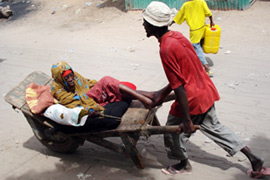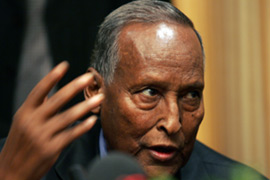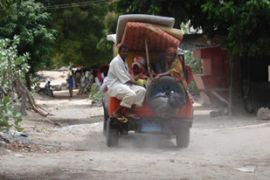More residents fled Mogadishu on Monday, adding to a growing humanitarian crisis as government forces backed by Ethiopian tanks stepped up efforts to crush fighters loyal to the Islamic Courts group.
Forced to flee
At least 70 people have been killed in more than a week of fighting that has driven tens of thousands of Somalis from their homes, residents and aid workers say.
 |
Somalis are fleeing the fighting
any way they can [AFP] |
The United Nations refugee agency estimates that 173,000 people have fled the fighting in the capital Mogadishu in just the past two weeks alone, bringing the total number of displaced people in Somalia to 850,000.
Hawa Amed, a 40-year-old mother of eight, said she had wanted to stay in her house deep in the sprawling Bakara Market, where allied Somali-Ethiopian troops were hunting for fighters and their hidden arms caches over the weekend.
“But after two policemen were killed outside on Sunday, we had to run,” she told Reuters as she left the city on foot, her youngest child strapped to her back.
“We are now heading to Madina District … we don’t know how we will survive.”
Hospitals overwhelmed
Not only are refugees overwhelming areas outside Mogadishu, wounded civilians are overflowing the local hospitals.
Returning from a visit to Mogadishu, European Commission officials said some 5,000 Somalis had been treated for war-related injuries in hospitals there since the start of the year, and that about a third of those were women and children.
Al Jazeera’s Mohammed Adow said in a city where few things worked apart from weapons, it was the lack of healthcare that was most appalling.
The under-equipped and under-staffed Madina hospital, one of only three offering help to Mogadishu’s sick and wounded, dozens of patients arrive daily.
A typical day for the surgical staff has them working round the clock to remove bullets, fix ripped intestines and perform amputations.
Relatives of patients have to help perform duties such as feeding and wheeling them between operating theatres and wards.
Space is also at a premium and patients are released early and the corridors are used as extra sleeping space to cope.
Ethiopian and Somali government troops have been battling Islamic Courts fighters in the Horn of Africa nation since Addis Ababa helped the interim administration rout them in January following a two-week war.
‘When elephants fight’
About 1,600 Ugandan peacekeepers were deployed in Mogadishu in March as the vanguard of a proposed 8,000-strong African Union force. No other nation has so far sent troops, although a similar number of Burundians are due to arrive this month.
 |
Somalia’s president says civilian casualties
in Mogadishu are unavoidable [AFP] |
Pascale Lund, the senior Red Cross official in Somalia, appealed to both sides of the conflict to “respect the international humanitarian law”.
But Somalia’s president says civilian casualties in Mogadishu are unavoidable.
“When two elephants fight, the grass gets damaged. We are not the cause of these deaths. It is being caused by those who attack the government.
“I urge the public to ask the militias fighting the government not to wage attacks from where they live,” Abdullahi Yusuf said.
Radio stations shut down
The government also appeared to wage war on the media on Tuesday, storming two radio stations in Mogadishu and ordering them off the air.
Workers fled Radio Banadir and Simba Radio when heavily-armed troops entered their compound on Tuesday.
Mustafa Haji, chief editor of Simba Radio, said: “They said the order to close the radio station will affect all independent stations in Mogadishu.”
Ali Muhamed Aden, deputy director of Radio Banadir, said: “They terrorised the employees… All the reporters panicked and ran.”
The move came a day after Shabelle Radio was shut down and two of its senior staff briefly detained.
Shabelle said on its website that it had received no explanation for its closure or been told how long it would last. It said it was the eighth time this year that the government had shut it down.
“There has been pressure, intimidation and death threats to the journalists from the government and other people,” it said.
Eight local reporters have been killed while doing their jobs in Somalia this year.
The authorities accused Shabelle and other Somali news organisations of supporting the Islamic Courts fighters earlier this year.



